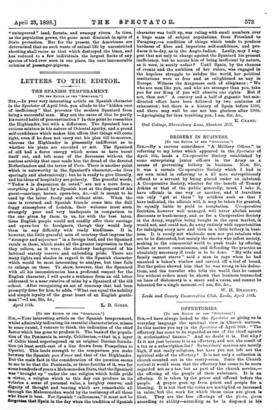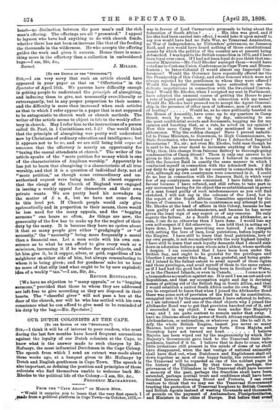OFFERTORIES.
have always looked to the Spectator as giving us in everyday language the spiritual view in Church matters. In this matter you say in the Spectator of April 16th "The offertory has come to be regarded as one of the chief agents in ecclesiastical finance." And no doubt it is. But why Is it not just because it is an offertory, and not the result of a tax or a subscription-list? Subscribers' motives are mostly high, if not really religious, but have you not left out the spiritual side of the offertory ? It is not only a collection in church counted out in the vestry-room. Since the Church revival it would seem that the offertory has come to be more regarded not as a tax, but as part of the church service,— the offering of the people of their substance. It is an offering. It is taken by the priest and offered before the people. A prayer goes up from priest and people for a blessing. It is not that the coins are multiplied or increased in value, but the work for which those coins are given is blest. They are the free offerings of the pioue, given according to ability—according as he is disposed in his
heart—no distinction between the poor man's and the rich man's offering. The offerings are all " presented." I appeal to laymen who have had anything to do with church funds, whether there has not been an increase like that of the feeding the thousands in the wilderness. He who accepts the offering guides the work and gives it success. Hence there is some- thing more in the offertory than a collection in embroidered bags.—I am, Sir, &c., Barnet. J. MILLER.
[To TIM ED/TOR Or TER "SPECTATOR."] SIR, I am very sorry that such an article should have appeared in your paper as that on "Offertories" in the Spectator of April 16th. We parsons have difficulty enough in getting people to understand the principle of almsgiving, and inducing them to give, not necessarily over-liberally or extravagantly, but in any proper proportion to their means ; and the difficulty is more than increased when such articles as that to which I refer appear in a paper that is not supposed to be antagonistic to church work or church methods. The writer of the article seems to object in toto to the weekly offer- tory in church. May I refer him to the instructions of a person called St. Paul, in 1 Corinthians xvi. 1-2 ? One would think that the principle of almsgiving was pretty well understood now by Christians of ordinary education and intelligence; but it appears not to be so, and we are still being told lisps ad nauseam that the offertory is merely an opportunity for "taxing the casual attendants at church." The writer of the article speaks of the " mute petition for money which is one of the characteristics of Anglican worship." Apparently he has yet to learn that almsgiving is a characteristic of all true worship, and that it is a question of individual duty, not of "mute petition," as though some extraordinary and un- authorised request were being made. It almost suggests that the clergy of the Church of England were engaged in issuing a weekly appeal for themselves and their own private wants. We are pretty hard hit nowadays in the matter of s. d., but we have not come down to this level yet. If Church people would only give systematically and in proportion to their means, there would be less need for the many appeals, and the "begging sermons" one hears so often. As things are now, the generosity of the few has to make up for the neglect of their duty by the many. It is because they have no system about it that so many people give either " grudgingly " or " of necessity," the "necessity" being more frequently a moral than a financial one. Let a man settle with his own con- science as to what he can afford to give every week as a minimum, increasing it if he wishes for special objects, and let him give it, be it copper, silver, or gold, regardless of his neighbour on either side of him, but always remembering to whom it is being given; and for goodness' sake let us hear no more of that silly (and what ought to be by now exploded) idea of a weekly " tax."—I am, Sir, &c.,
RECTOR RUSTICANTTS.
We have no objection to "many appeals," or to "begging sermons," provided that those to whom they are addressed are left free to give according as they are disposed in their hearts. The " cheerful giver" will not pass a box at the door of the church, nor will he who has settled with his own conscience what he can afford to give need to be reminded of his duty by the bag.—ED. Spectator.]



































 Previous page
Previous page